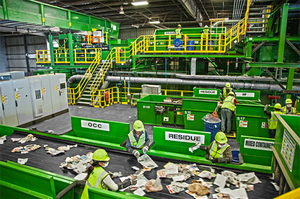December 1, 2002
Lynn Schenkman
The European Union (EU) recently voted on two electronic waste (e-waste) directives that look as foreign to the United States as driving on the left side of the road. But American electronics manufacturers will have to get used to the new recycling rules if they want to sell their products in Europe.
The two legislative mandates expected to become law by 2003 will require manufacturers to take back and recycle their own products and will decrease the amount of toxic ingredients allowed in all appliances.
Commonly referred to as WEEE (Waste, Electrical and Electronic Equipment), and RoHS (Restrictions on Hazardous Substances), the directives cover everything that has a cord or battery, such as personal computers and curling irons.
Heavy metals, such as lead, mercury and cadmium, must be replaced with less harmful substances by 2008. And five years after the WEEE directive is enacted, all manufacturers — including small businesses — will have to provide customers with free recycling drop-offs. Businesses also will have to organize and finance the treatment, recovery and disposal of 60 percent to 80 percent of their own waste, depending on the type of product they make.
“This will affect American manufacturers if they want to sell in Europe,” says Michele Raymond, editor and publisher of “Recycling Laws International” and other recycling newsletters. “Manufacturers are going to have to show proof at import that they've already paid their fees.”
European electronics manufacturers are more worried than other nations and are bracing for the effects the laws will have on their budgets. Industry leaders in the United Kingdom say the estimated $7.4 billion per year in recycling costs could kill electronics manufacturing and trigger a trade war with countries such as China, the final destination for most of the world's e-waste.
Although similar government recycling mandates are unlikely in the United States, piecemeal measures have been taken to reduce e-waste. For example, California has established e-waste recycling programs as have some manufacturers, such as Dell Computer, Hewlett-Packard and IBM. Additionally, Congressman Mike Thompson, D-Calif., recently introduced legislation calling for a federally sanctioned grant program that establishes computer recycling. But European and American governments have philosophical differences when it comes to environmental legislation.
“I don't think [the EU's directives] mean anything … to the U.S. government,” says Robert Tonetti, scientist with the U.S. Environmental Protection Agency Office of Solid Waste. “This is definitely of interest to us and gives us a set of ideas to think about, but it has more to do with corporations and companies than it does with governments. [In the United States], we're looking for a more cooperative approach rather than the government directing everything. [America] is a long way from considering the RoHS directives.”
Nevertheless, e-waste disposal is a problem. The United States generates more e-waste than any other nation, according to the EPA. More than 500 million computers will become obsolete by 2007, which will result in at least 1.58 billion pounds of lead and 6.32 billion pounds of plastic needing disposal, and that amount is expected to rise.
The EU estimates that e-waste accounts for 6 million tons of garbage across Europe, most of which ends up in landfills. Officials hope up to 75 percent of appliances will be recycled by 2006.
You May Also Like


